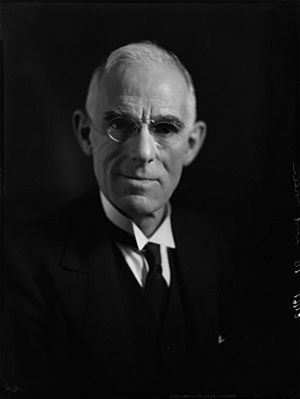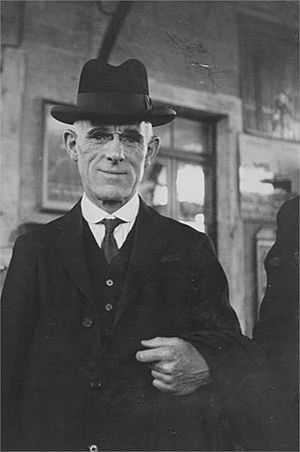Harry Snell, 1st Baron Snell facts for kids
Quick facts for kids
The Lord Snell
|
|
|---|---|
 |
|
| Chief Whip of the House of Lords Captain of the Honourable Corps of Gentlemen-at-Arms |
|
| In office 31 May 1940 – 21 April 1944 |
|
| Monarch | George VI |
| Prime Minister | Winston Churchill |
| Preceded by | The Earl of Lucan |
| Succeeded by | The Earl Fortescue |
| Parliamentary Under-Secretary of State for India | |
| In office 13 March 1931 – 24 August 1931 |
|
| Monarch | George V |
| Prime Minister | Ramsay MacDonald |
| Preceded by | The Earl Russell |
| Succeeded by | The Marquess of Lothian |
| Member of the House of Lords Lord Temporal |
|
| In office 23 March 1931 – 21 April 1944 Hereditary Peerage |
|
| Preceded by | Peerage created |
| Succeeded by | Peerage extinct |
| Member of Parliament for Woolwich East |
|
| In office 15 November 1922 – 22 March 1931 |
|
| Preceded by | Robert Gee |
| Succeeded by | George Hicks |
| Personal details | |
| Born | 1 April 1865 Sutton-on-Trent in Nottinghamshire, England |
| Died | 21 April 1944 (aged 79) London, England |
Henry Snell, 1st Baron Snell (born April 1, 1865 – died April 21, 1944), was an important British politician and activist who believed in socialism. He worked in the government under Prime Ministers Ramsay MacDonald and Winston Churchill. He also led the Labour Party in the House of Lords during the late 1930s.
Contents
Early Life and Education
Henry Snell was born in Sutton-on-Trent, Nottinghamshire, England. His parents worked on farms. He went to his local village school.
At just eight years old, Henry started working as a farm hand. By age ten, he was working full-time. At twelve, he became an indoor servant on the farm.
Henry wasn't happy with farm work. He left home and traveled around the county. He took many different jobs, like being a groom or working at Hazelford Ferry on the River Trent. He also worked as a French polisher in Nottingham.
During times when he didn't have a job, Henry spent his time reading a lot. He was especially inspired by the writer Henry George.
Finding His Beliefs
In 1881, Henry was inspired by Charles Bradlaugh and the idea of secularism in Nottingham. Secularism means separating government and public life from religious control. Henry joined the National Secular Society.
He grew up with strict Anglican Christian beliefs, but he didn't agree with them anymore. However, he still had some religious faith. He decided to join the Unitarian Church. He liked their scientific way of looking at Christian ideas and their open-minded values.
A Unitarian teacher, John Kentish-White, introduced Henry to the works of famous poets like Lord Byron and Samuel Taylor Coleridge.
Moving to London and Activism
Through people he met in the Unitarian movement, Henry found a job in London. He became a clerk at the Midland Institute for the Blind. He continued to learn on his own by reading at the University College London library.
He was influenced by writers like Thomas Paine, William Morris, John Ruskin, and John Stuart Mill. Eventually, even Unitarianism felt too strict for him. He became an agnostic, meaning he believed it was impossible to know if God exists. He rejoined the National Secular Society.
After hearing Annie Besant talk about socialism, Henry joined the Social Democratic Federation. This group wanted to create a more equal society. He helped with John Burns' election campaign for Parliament in 1885.
Henry also started speaking at public meetings himself. He appeared with other important figures like Henry Hyndman, Tom Mann, Eleanor Marx, and Ben Tillett. He actively supported the Bryant and May match factory strike and the London dock strike of 1889. These strikes helped workers get better conditions.
Becoming a Member of Parliament
In 1890, Henry Snell started doing social work for a charity in Woolwich. Later, he became a secretary at the London School of Economics. He joined the Independent Labour Party and, in 1894, the Fabian Society. These groups worked to improve society for working people.
Henry traveled a lot around Britain, giving talks about socialist ideas. He spoke alongside people like Ramsay MacDonald. He also lectured for ethical societies in Britain and America.
He tried to become a Member of Parliament for Huddersfield several times but didn't win. In 1919, he was elected to the London County Council, where he served until 1925.
Finally, in the 1922 General Election, he became a Member of Parliament for Woolwich East. He was re-elected in 1929.
The Shaw Commission
In late 1929, Henry Snell was chosen to be part of the Shaw Commission. This group was set up to investigate Arab uprisings in Mandatory Palestine, which is now Israel and Palestine.
When the Commission shared its findings in March 1931, Henry wrote a separate report. He disagreed with the idea that Jewish immigration and land buying should be limited.
Henry also disagreed with the Commission's claim that Palestine was too crowded. He believed earlier reports that said the area was under-populated and not fully farmed. He felt that Jewish immigration had actually improved life for Arab workers. He warned that the Commission was wrongly making people think immigration was a danger to Arabs. After this, Henry became a strong supporter of Zionism, which supports a Jewish homeland.
From 1931 to 1932, he was President of the British Ethical Union. This group promotes secular humanism, which is a non-religious way to think about right and wrong.
In 1930, Henry Snell was given the honor of being a Commander of the Order of the British Empire (CBE).
Serving in the House of Lords
In 1931, Henry Snell left his seat in the House of Commons. This allowed George Hicks, a leader in trade unions, to take his place. Henry was then made a Baron on March 23, 1931, which meant he became a member of the House of Lords.
Prime Minister Ramsay MacDonald made him the Under-Secretary of State for India. When a new "National Government" was formed, Henry was asked to stay in his role. However, he chose to remain loyal to the Labour Party and refused.
In the House of Lords, he spoke about farming issues, especially caring for rural workers. He also talked about foreign affairs. He was part of the British Institute of Parliamentary Affairs and the Empire Parliamentary Association. He was also appointed to the British Council, eventually becoming its vice-chairman.
In 1935, Henry Snell became the Labour Party's leader in the House of Lords. He served under Clement Attlee. In 1936, he published his autobiography, Men, Movements and Myself. In 1937, he became a Privy Counsellor, another high honor.
Later Years and World War II
As leader in the Lords, Henry Snell strongly opposed the growing threat of fascism. He criticized the government for trying to make peace with Nazi Germany instead of standing up to them. He also spoke out against their refusal to help the Republican government during the Spanish Civil War. He continued to support Zionism.
In 1938, during a debate in the Lords, he supported the idea of moving Arab populations in Palestine. This was for the purpose of developing the land and creating organized settlements. He noted that similar moves had happened in Libya and other Arab countries without protest.
By 1940, Henry was seventy-five and his health was not good. He stepped down as the leader of the Labour peers. However, he got better. In 1941, Winston Churchill appointed him as Captain of the Honourable Corps of Gentlemen-at-Arms. This role was like a deputy leader in the House of Lords.
During World War II, he led several committees and investigations. In 1943, he received the Companion of Honour award. Henry Snell became ill in March 1944 and passed away less than a month later. His title as Baron ended with his death.
See also
- Shaw Commission
 | Valerie Thomas |
 | Frederick McKinley Jones |
 | George Edward Alcorn Jr. |
 | Thomas Mensah |


